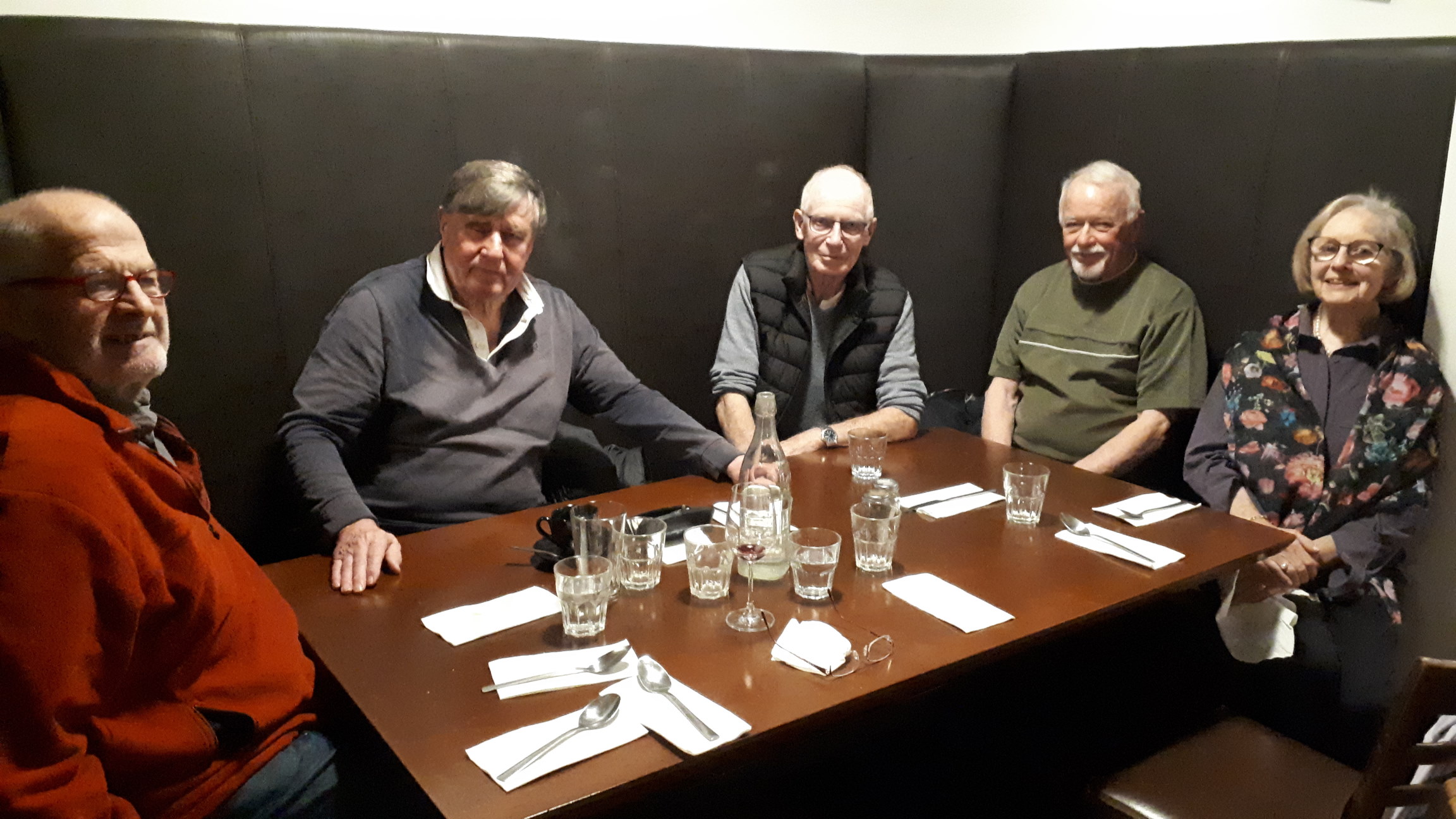In this issue:

What we’ve been doing
The Wellington Central Grey Power Association Committee of four would like more members to join us in our work. Our Vice President David Cuthbert, Acting Treasurer Bruce McLachlan and Membership/Newsletter Editor Owen Watson all agree that the workload is not arduous, but essential to maintain Association membership with the Grey Power Federation. In particular, we are seeking a Secretary and Treasurer as well as committee members. Some Associations hold monthly meetings with speakers and attract more than 100 members. That has not been our experience in Wellington when we hold a public meeting so we encourage all our members to join us.
The Association recently held a well-attended public meeting where we heard from the Wellington Region Representative for the Retirement Villages Residents Association, Glynis Denz
The Association provides a voice for residents at both a local and national level. They want residents to fully enjoy the activities village life provides.
Their current work is focused on a review of the Retirement Villages Act 2003 and the Retirement Villages Code of practice 2008 to improve the legislation and practices that govern retirement villages.
While few Grey Power members attended the meeting, members of the public who saw the advertisement in The DominionPost attended and drew out more information from their excellent questions.
Last week I met Glynis and the Association President, Brian Peat from Dunedin, to discuss the many issues we have in common.
Colleen Singleton, President
Get on the pill
I’m talking about the free antiviral pills that the government provides to over-65s (and some other at-risk categories) to help you stay away from hospital if you catch Covid-19. I was impressed how straightforward it was the day I got a positive RAT test. I rang the pharmacist (Unichem Central on Lambton Quay, or you can ring Healthline), and she went through my record, and couriered over the pills on the same day. I got a call from Healthline halfway through the treatment to check on how I was doing, and later a text telling me my isolation period was over. The expense of the antiviral medication is good value for the taxpayer if it keeps people out of hospital.
Owen Watson
Scam scam scam
They’re everywhere and hard to escape; all it requires is for your attention to be elsewhere, or having a bad day, and suddenly your bank account is haemorrhaging. Seniors are at particular risk, as they have lived mostly in a high-trust environment, so the Government invited Grey Power and other organisations representing seniors along to Parliament for a seminar on avoiding scams. We heard from organisations like Crimestoppers, Cert NZ (cyber security), Netsafe and a consultant on romance scams. The main message is to be sceptical of anything that comes in your email, texts, messages or phone calls that asks for money, intimate pictures, or control of your computer. Microsoft, your internet provider, or Spark won’t call you out of the blue about faults they can only fix by getting access to your PC.
The romance scam expert took up the cause after being cheated out of her home and uses the experience to advise others on what to do. A common variant of the scam is to elicit an intimate photo or confession out of you that is then used for blackmail.
We heard advice on what to do if a friend or relative becomes a scam victim. Help them rather than blame them. If they are too embarrassed to report it, encourage them to call Crimestoppers anonymously on 0800555111. You can also call Cert NZ (0800237869) if you want to leave your name. These helplines advise you on what to do. And of course if the person is in danger call 111.
Owen Watson

Retirement villages – easy in and costly out
We had a good audience to the talk we organised on the pros and cons of retirement villages. The speaker was Glynis Denz from the Residential Village Residents Association (RVRA) which advocates and lobbies on behalf of the residents. There was a member of the village owners’ association in the audience to represent their point of view.
She emphasised that most seniors loved living in the villages, but the problems often started once a resident left the unit they had “purchased”, as they have occupation rights rather than ownership rights. People think when they go in that it will be their last home, but often need to leave because they or their partner are going into care, or for some other reason. Getting back your money can be an uphill struggle, and many homes keep on charging fees, even if you’re not living there and a new person hasn’t moved in. Glynis’ mother left her apartment and it was 19 months before she got her money back, and she had to pay the monthly fees for those 19 months.
The Association lobbies on behalf of residents, appearing at the select committee hearings on residential village regulations, getting the Retirement Commissioner Jane Wrightson on side and making submissions to the Commerce Commission.
If you are thinking of going into a village, do your homework first. Check out the occupational rights agreement, preferably with a lawyer, and look through the RVRA website on https://www.rvranz.org.nz/ . It’s got lots of useful guidance.
Owen Watson
Growing old in an adopted land
I recently attended a seminar at Victoria University entitled ‘Growing old in an adopted land’. The research of Dr Ágnes Szabó and her colleagues from the School of Health focuses on intersecting areas of health, ageing and immigration. Members of the 17 same-ethnic focus groups, who were born in other countries. all moved to New Zealand at different ages.
Dr Szabo described “ageing well” as circle that included:
- maintaining health – mental and physical, family wellbeing
- realising capabilities – agency and freedom, enabling environments and financial security
- cultivating belonging – who has the right to belong, discrimination a barrier to belonging and a systemic issue
- managing cultural expectations – being embedded in one’s culture and having access to one’s culture.
Many ethnic groups have lost their language. Children who cannot speak their family language create a cultural gap. They will not be able to read their inherited literature. Language is the connection between grandparents and grandchildren. Grandparents want to communicate in their own language to teach the children about their culture, religion and rituals.
Migrants have the unique challenge of maintaining connection with their homeland and finding a place in Aotearoa, New Zealand. This includes making decisions about where to live for the rest of their lives. Place identity and place dependence confer a sense of belonging and purpose. Migrants have many reasons for making New Zealand their home, anywhere from needing to leave their home country to finding a better life.
In summary,
- All participants had strong place identities in their country of origin
- All participants developed place dependence to New Zealand via various means
- The ways that allowed some participants to feel they belonged in Aotearoa, New Zealand could also make it more difficult for others.
Colleen Singleton
Grey Power Federation news
Strategic planning The Grey Power Federation Board is undertaking a strategic planning exercise and Associations have said that they would like direction from the Board on several major issues, especially given the upcoming election year. The Federation and Associations are stretched when we don’t have enough members and the skills needed to address the many issues facing seniors. Case studies are helpful, but research is a better tool. Further strategic planning work will take place at the mid-December Board meeting.
Membership and Grey Power Electricity The Board is aware that declining membership continues to be an issue. Board income is dependent upon membership and payments from Grey Power Electricity. New members are encouraged to join Grey Power Electricity and members who have not taken advantage of the Grey Power Electricity discount offers are encouraged to do so.
Board Committees As well as chairing the Strategic Planning work, I have been appointed the Board Chair of the Communications/Marketing Standing Committee.
Purging the Federation database Associations have been notified of the Board’s decision to purge the Federation database of unpaid members of Associations as at 31 December each year, the end of the Federation’s financial year. Wellington Central Grey Power Association’s financial year ends on 31 March each year.
Zone 4 Representative Colleen Singleton
Downsizing is an issue for older Kiwis
In our recent nationwide survey of 2833 Grey Power members 70% stated they were living in a mortgage-free home.
However, 41% were looking at downsizing in the next 5-10 years. This frees up larger homes for younger families while providing our retirees with independent living in smaller, low-maintenance, warm and dry homes. With rates, energy costs, and home maintenance costs escalating, many of those dependent on NZ Super as their main source of income are looking for other housing solutions.
Sounds simple, doesn’t it? The reality is quite different.
56% of those planning to downsize have little suitable housing available in their community. They want to remain in their communities, yet developers often focus on more profitable housing developments than the needs of our ageing population. In addition, over 30% stated that obtaining finance to downsize and/or subdivide their current section was a significant hurdle! A retiree with NZ Super as their only income can’t obtain bridging finance to purchase a smaller home, before selling their own property. No bank we have spoken with will provide bridging finance that cannot be serviced from the retiree’s income. In desperation some homeowners have sold their 3-4 bedroom home, planning to downsize locally, but have been forced instead to retire to a smaller rural community where they have no social links or family support.
We need a circuit breaker to facilitate downsizing. With more smaller homes available for independent retirees, there would be larger homes available for families, the potential for intensification, less pressure on horticulture land for local housing developments and provision of more affordable homes for young working families.
From Tauranga/BOP Grey Power magazine
Show who you are with a Kiwi Access Card
The Kiwi Access Card is an easy way to access goods and services, especially if you do not hold a drivers licence or passport. The card has been specifically designed for people aged over 60 to ensure they have a reliable and secure evidence of identity.
If you do not have a New Zealand drivers licence or passport, you need someone who can prove you are over 18 and some other form of identification, like your birth certificate.
If you want to apply for a Kiwi Access Card but struggle to get to your nearest NZ Post shop or AA Centre, you can now apply online. The digital application process provides a secure and innovative platform. All new card applications cost $60.
From the Seniors Newsletter/Office for Seniors
In short
Government to pay more to nurses in aged care To close gaps with hospital nurses – and to decrease pressure on hospitals
Raising NZ Super age would cause financial misery for over 65s – Retirement Commissioner says: https://www.stuff.co.nz/business/money/130598746/raising-nz-super-age-would-cause-financial-misery-for-over-65s–retirement-commissioner-says
An excellent article by Dr Andrew Hubbard of Citizens Advice Bureau about how the push to put services online excludes many people: https://www.stuff.co.nz/opinion/129394958/government-services-must-include-the-digitally-disadvantaged
The growth in self-employment in older workers: https://www.rnz.co.nz/news/business/475721/support-needed-for-workforce-veterans-transitioning-to-self-employment-report
How older people played their part in the Covid-19 response: https://www.wgtn.ac.nz/sacs/about/events/elder-agency-how-older-new-zealanders-played-their-part-in-new-zealands-covid-19-response
How the pension is essential to many older people: https://www.stuff.co.nz/business/300643774/id-probably-be-on-the-streets-without-it-pensioner-tells-nz-super-researcher
Steady as you go exercise classes: https://www.acwellington.org.nz/saygoexercise/
Interislander discounts for Grey Power members: https://greypowerwellington.org.nz/interislander-discounts-announced/
Seniornet classes to learn about tech (and genealogy!), mostly starting in February: http://www.wellingtonseniornet.co.nz/
Have a great Christmas and New Year!


